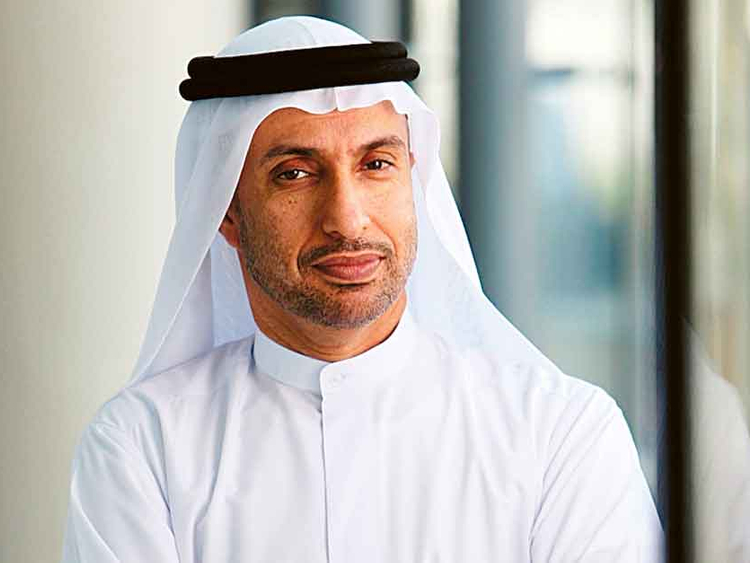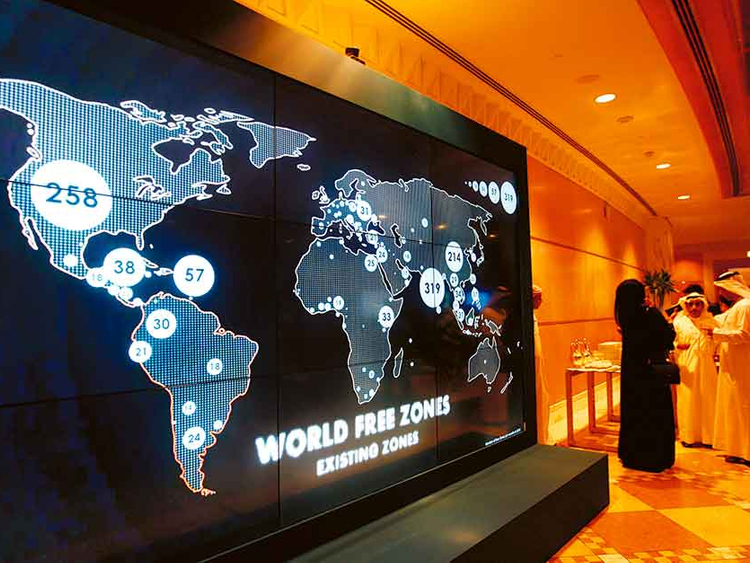The start of 2016 has been beset by dire economic warnings.
The global economy is now exposed to greater risk of negative shocks and stagnation, the IMF warned recently, as it cut its growth outlook for 2016 to 3.2 per cent from 3.4 per cent.
The World Bank is more dismal, putting GDP growth at 2.5 per cent, down from a forecast 2.9 per cent. Trade is down too, by 0.4 per cent in volume and 3.8 per cent in dollars, the Merchandise World Trade Monitor says.
With those predictions casting a pall over the year ahead, governments and businesses must pull out all the stops to stimulate growth. One attempt to raise cross-border investment and improve business prospects is through the hundreds of tax-friendly special enterprise or free zones.
More than 1,000 international delegates meet in Dubai this week at the second World Free Zones Organisation’s (WFZO) annual conference, to outline some ways forward in this period of global uncertainty.
Ahead of the event, Dr Mohammad Al Zarooni, Chairman of WFZO, spoke to GN Focus about how free zones can improve growth.
GN FOCUS (GNF): As the world heads into what the IMF calls a possible period of enforced stagnation, how do free zones stay relevant?
DR MOHAMMAD AL ZAROONI (MAZ): In fact, global economic growth currently presents a mixed picture. Macro data from the US is reasonably encouraging, falling unemployment numbers, for instance. While Europe and Japan do not present a pretty picture, China’s growth is slowing.
But remember, the Asian giant’s slowdown is from a high base. Governments and central banks are using instruments in their armoury to spur growth. Despite all this, there is the possibility of enforced stagnation.
While free zones can’t stay completely insulated from global growth dynamics, they are less insecure in the sense that a slowdown or stagnation isn’t likely to impact free zones as severely given that they are often special enclaves that generally enjoy governments’ policy and fiscal support.
If anything, we at WFZO have begun to research not only how best free zones can keep up the usual level of economic activity but also how free zones can make some difference to the national economy through job creation, income generation and trade promotion.
GNF: So what new clusters must governments look to establish?
MAZ: Technology will certainly top the list. It is technology, technological innovation and adoption that will drive future growth of most kinds of businesses. So, for governments, it would make sense to establish free zones that promote tech-intensive activities that benefit the largest number of people.
The second area of priority is nutrition and health. The nutrition status among a large number of people in developed and developing countries leaves much to be desired. Over-nutrition and under-nutrition are equally undesirable. Governments will do well to establish free zones that would research ways and means to address the nutrition issue from a long-term perspective.
The third area would be clean energy. To ensure energy security and sustainability and at the same time reduce the adverse effects of climate change, clean energy clusters can play a significant role, especially in tropical regions that are more vulnerable to the adverse consequences of global warming.
GNF: Let’s talk about foreign direct investment into free zones. Which new markets are now pulling in FDI projects? Do companies still see FDI as the preferred market entry mode or are there ways to expand?
MAZ: FDI has been the preferred mode of investment in free zones and most likely will continue to be so for the foreseeable future. I believe more and more FDI will flow from developed countries to emerging markets. I see Africa and Asia as the new or less-explored frontiers that will attract larger amounts of FDI. Specifically, which markets will be the new pioneers in attracting new FDI projects will depend on the geography that is to be serviced. Again, I would venture to place the whole of Asia and Africa as the new geographies.
Investment options continually evolve over time, based on exigencies of the situation and market demand. While FDI has traditionally been the preferred mode of market entry, newer forms are emerging. Transborder public-private partnerships have potential and are turning out to be a real possibility.
With regard to free zones, newer forms of investments can be triggered by newer incentives. For example, some free zones establish an incubation centre, which has resulted in win-win situation for all stakeholders in the free zone ecosystem. It encourages SMEs and start-ups to invest, and in turn become suppliers to larger firms, leading to specialised supply chains within the zones.
GNF: A lot has been said about global value chains recently. How do free zones benefit from them?
MAZ: Given differences in endowment of natural resources, capital and skills, and the need to optimise business operations, corporations are constantly exploring opportunities to maximise the quality goods at minimum cost.
This has meant that, for instance, raw material is produced in one country, processing takes place in another, assembly in a third and consumption in all three plus a fourth country. Effective connection or link of these geographies is necessary through what is now termed a global value chain.
Every stakeholder in the chain attempts to capture maximum value. But in a value chain, the stakeholder who is customer-facing often manages to capture relatively more value than the others in the chain. [But] free zones can position themselves to maximise value capture.
GNF: A concern about free zones is their laws aren’t always conducive to sustainable development. How can they help meet the UN’s global goals?
MAZ: Sustainable development must become what I call an obsessive-compulsive order. It may not be appropriate to assert that sustainable development is anathema to enterprise zones. These zones must perceive the benefits — tangible and intangible — of sustainable development. Awareness and education may be needed. Indeed, free zones contribute to advancing as many 13 of the 17 UN sustainable development goals.
GNF: As traditional tax incentives to attract companies become incompatible with international trade law and exemptions for developing nations expire, how can free zones attract change?
MAZ: [I] concede that until now, tax breaks and incentives drove businesses into free zones; and on the horizon change is looming. Instead of a one-size-fits-all approach or a blanket withdrawal of concessions, it may be necessary to evolve differentiated strategies for free zones.
These could be regionally or nationally differentiated or it could be based on contribution to sustainability, for instance. It is necessary to remember that the global policy context is becoming increasingly complex.
Every country faces domestic socio-economic and political compulsions even as it tries to meet international obligations. This process of attracting change is going to be slow, tedious and occasionally painful.
GNF: What can we expect from this week’s WFZO event?
MAZ: The WFZO event in Dubai this year seeks to bring stakeholders around the world on to a single neutral platform to crystal gaze into the future, and evolve broad strategies to meet emerging challenges as well as explore newer opportunities in tune with changing global market dynamics.
WFZO is launching a new initiative at the conference called Free Zone of the Future Programme, which seeks to empower free zones and ensure they build and contribute to a sustainable and prosperous future — one that supports the growth of local economies and communities even while being able to benefit from the global market dynamics.
This programme would help free zones grow their business, be more aligned to best practices and improve their operational efficiency. Through the programme, we aim to bring together the ecosystem of free zone partners from around the world and help them contribute to building a new global trade order.
GNF: Finally, what were the successes of last year’s event?
The first Annual International Conference and Exhibition of World FZO was held under the patronage of HH Sheikh Mohammed bin Rashid Al Maktoum, Vice-President and Prime Minister of the UAE and Ruler of Dubai, in May 2015. The event was an enormous success with delegates representation from across the world. This was a ground breaking endeavor and arguably the first of its kind that brought together domain experts across categories of stakeholders.
The success of last year has resulted in substantial increase in our member base. We have a much wider coverage in terms of geographic spread of our membership. Further it encouraged many nations to apply to host future events.
Through a number of speeches by eminent personalities, workshops and panel discussions by domain experts, the last year’s conference literally set the tone for a new global trade order.














